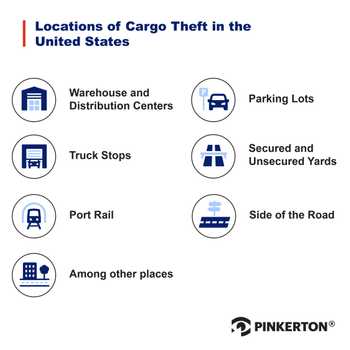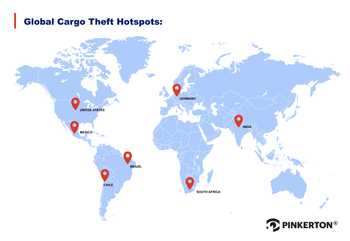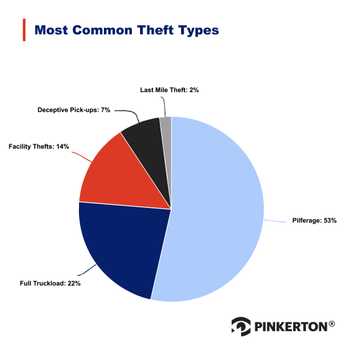Cargo and supply chain theft is emerging as a critical concern, driven by bold criminal organizations targeting the intricate logistics networks that fuel global commerce. This global crime wave touches every corner of the world. From warehouses and distribution centers to truck stops and the sides of roads, no location seems immune.
To better understand these challenges and potential solutions, we connected with Pinkerton's Investigations Manager, Michael Corvi. With a rich background in law enforcement, he provides insightful answers and strategies to combat the burgeoning threat of cargo theft, offering both a grounded perspective and practical advice.
PNK: Why is cargo theft grabbing more headlines than other retail crimes?
MC: Cargo theft has seen a steady increase, particularly because it offers thieves the opportunity to steal larger volumes of merchandise. The rise in global shipping and e-commerce has expanded opportunities for targeting goods in transit, often making these crimes more lucrative and more accessible than traditional in-store theft, where security presence is typically stronger.

PNK: Beyond the dollar signs, how does cargo theft shake up supply chains?
MC: Cargo theft disrupts logistics and scheduling of deliveries, prompting retailers to incur additional costs such as expedited shipping to replenish inventory. These disruptions can lead to delayed deliveries, causing operational bottlenecks. Furthermore, stolen goods flooding secondary markets often undercut pricing, impacting retailers’ profitability and market strategy.

PNK: Is it possible to recover stolen cargo?
MC: Recovering stolen cargo and identifying suspects can be challenging. Getting involved in a theft investigation as early as possible is crucial to identifying leads, suspects, locations, etc. Often, there’s a lapse between the time of the theft and Pinkerton's involvement, making it more challenging to chase down leads.
Recovering stolen cargo often involves a blend of undercover operations and collaboration with law enforcement. A majority of cargo theft complaints we receive are connected to the Los Angeles, California area, a hub for the distribution of goods throughout the United States. We have had success in working with Los Angeles-based Cargo Theft Task Forces, providing them with our investigative findings and evidence to conduct search warrants or arrests.
PNK: What’s your playbook for investigating cargo theft?
MC: My background in law enforcement has instilled a methodical approach to investigations — including the ability to recognize crime patterns and trends. Each case is treated with courtroom-level scrutiny, prioritizing evidence gathering and suspect identification.
Organized retail crime (ORC) and cargo theft investigations often span multiple law enforcement jurisdictions and involve numerous security teams to tackle organized crime organizations effectively. Collaborations with law enforcement can expedite the recovery and increase the chance of identifying the vehicles and individuals involved through the review of CCTV and GPS data.
An effective method is deploying undercover investigators to identify and purchase stolen goods, using the data gathered during the investigation. And, carefully documenting each step of the investigation is crucial in providing the client with details of the investigative plan.
PNK: Is investigating cargo theft more challenging than investigating in-store crime?
MC: One of the primary challenges is establishing an accurate timeline and location of the theft, especially when it occurs in transit, where documentation might be lacking. This timeline is crucial for developing investigative leads and determining the logistics of the crime.
PNK: How do you start an investigation?
MC: In our pursuit of recovering stolen goods, Pinkerton engages the expertise of our SCOUT team analysts to pinpoint specific client items. Once we have details on the location of the theft and the missing products, our analysts employ advanced analytical techniques to track down individuals selling the client's merchandise in the targeted area. By honing in on these sellers, we can direct our investigative focus effectively, ensuring a thorough and precise investigation that bolsters our client's stolen cargo recovery efforts.
Recovering stolen cargo and identifying suspects can be challenging. Getting involved in a theft investigation as early as possible is crucial for identifying leads, suspects, locations, and other important details. Often, when there is a delay from the time of the theft until Pinkerton's involvement, it becomes more difficult to chase down leads. Pinkerton has had success working with Los Angeles-based Cargo Theft Task Forces by providing investigative findings and evidence for search warrants or arrests.
PNK: How do the pros — logistics companies and investigators — team up to tackle cargo theft?
MC: Collaboration plays a pivotal role, where logistics companies provide necessary documentation, timelines, and relevant information about the stolen items. Such transparency and timely provision of data enhance the effectiveness of investigations. Pinkerton, for instance, engages with logistics firms to identify lapses and offer strategies to mitigate future thefts.
PNK: What part do wholesalers and transportation companies play in keeping cargo theft at bay?
MC: During cargo theft investigations, wholesalers and transportation companies contribute significantly by offering insights through interviews with warehouse employees and providing access to CCTV footage and operational logs. These efforts help ensure adherence to policies and procedures, identifying any behavioral or process gaps that could have facilitated the theft.

PNK: Is there a case you can share with us?
MC: Recently, Pinkerton had a cargo theft case in the Los Angeles area. The client was dealing with the theft of proprietary merchandise, exclusive to their brand, only available for purchase from the client. Using the sharp analytical capabilities of our SCOUT team, Pinkerton tracked numerous individuals who were selling this unique merchandise in the vicinity of the theft.
Our attention zeroed in on a particular wholesaler, who had an unusually large stock of the client's items available for sale online. This led our investigators to concentrate their efforts on this seller. An undercover investigator arranged for an in-person purchase at the seller's warehouse. During this operation, the investigator obtained photographic evidence of the client's products within the warehouse and successfully conducted the purchase of the stolen goods.
The evidence was then shared with a Los Angeles-area Cargo Theft Task Force. Thanks to the information supplied by Pinkerton, law enforcement secured a search warrant for the warehouse, leading to the recovery of hundreds of thousands of dollars of stolen merchandise, which was returned to the client.
PNK: One last question: How are criminal groups sidestepping improved security, and what signs of trouble should organizations keep an eye out for?
MC: Organized criminal rings involved in cargo theft are adept at bypassing newly implemented security measures. As logistics firms enhance safeguards with advanced technologies and tighter protocols, these groups often develop new tactics to exploit vulnerabilities. For example, they may target less secure transit routes or manipulate insider information to plan thefts. Early warning signs of potential cargo theft activities can include unexpected changes in delivery routes, anomalies in shipping documents, or frequent access requests by unfamiliar personnel at transport facilities. Organizations should prioritize monitoring these indicators to stay ahead of criminal activity and work closely with security experts and law enforcement to effectively mitigate risks.
Is your business prepared for the escalating threat of cargo theft? Let Pinkerton be your frontline defense. Contact us today to discover Pinkerton security solutions and global supply chain risk management strategies to protect what matters most – your people, places, and assets.





